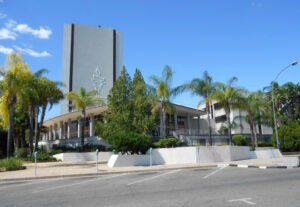[ad_1]
THE fourth Industrial Revolution task force, which has been appointed by president Hage Geingob, has recommended to the Presidency that a national data centre be established as a critical asset.
The proposed centre would allow the country to take ownership of all state data, which is currently fragmented, incomplete and vastly inaccurate, the task force says.
It has made the Office of the Prime Minister, as well as the Namibia Statistics Agency (NSA) accountable for this project.
Anicia Peters, the chairperson of the task force, says the data centre would ideally not house private data, but all state data, and would include a private government data cloud.
She says the government has very little control and ownership of data, and does not have all rights to some data of citizens.
“Software systems within the government in Namibia are mostly developed by foreign companies, which store data elsewhere, and can do with it all they want,” she says.
Peters, a computer scientist specialising in human–computer interaction, who also doubles as University of Namibia pro vice chancellor for research, innovation and development, says where Namibian offices require data, permission from data developers is needed.
A national data centre would involve a large group of networked computer servers typically used for remote storage, processing, or the distribution of large amounts of data.
Currently, each of Namibia’s government offices and agencies has its own data servers without any interoperability, while the Office of the Prime Minister has a rather small data centre, mainly hosting data from locally developed software.
Peters says for the new age data is gold, and a national data centre is crucial for the state to be efficient in the delivery of services, but it would need to comply with data standards.
“The data centre would need data standards that would make interoperability work, and all data needs to conform to this,” she says.
She says available data is important for planning and openness, and creates new opportunities for the country, such as the use of artificial intelligence.
Without a national data centre, data standards and no interoperability, Peters says the country’s various offices and the private sector would be duplicating data saving and collecting.
“Artificial intelligence and KIC needs are now duplicated, because data sources are not interoperable. There is also legislation that prevents the private sector from getting access to national data or data sharing,” she says.
In 2018, Tshilidzi Marwala, a member of the task force, said there was a need for African nations to gather data.
“We need to politically organise ourselves to create economies of scale. Regionally, organisations such as the Southern African Development Community and Economic Community of West African States should create regional data banks that collect, protect and store regional data.
“Continentally, the African Union should coordinate data gathering and develop data-protection policies. We need to create laws and policies that regulate data nationally, regionally and continentally,” he said.
Email: [email protected]
Twitter: @Lasrus_A
[ad_2]
Source link




